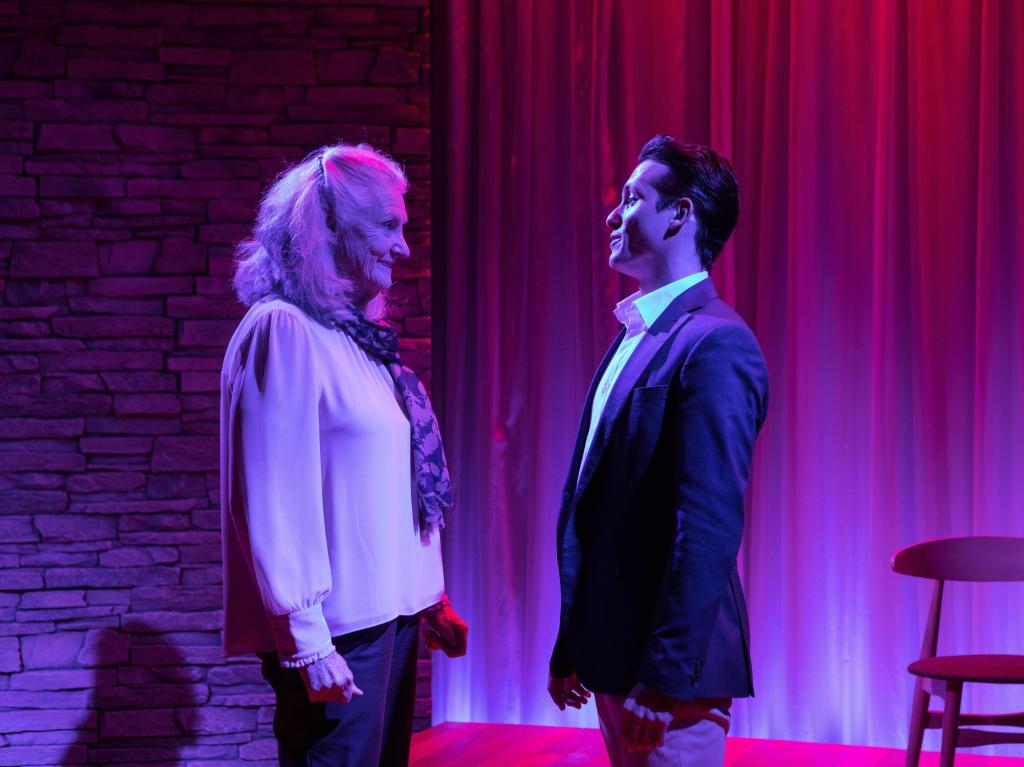Ensemble Theatre’s Marjorie Prime. Photo by Lisa Tomasetti.
In the not-so-distant future, artificial intelligence has evolved to the point where they have become convincing proxies for our lost loved ones, holographic stand-ins to aid us in dealing with grief. One such ‘Prime’ is purchased by Tess and Walter, a forty-something married couple, in order to aid Tess’ dementia-suffering mother Marjorie cope with memory loss. As ‘Walter Prime’, a 30-yr-old reimagined version of Majorie’s late husband, bonds with Marjorie, apprehensions are stirred about the worth of comfort sought in artifice, and whether some memories are best left forgotten.
Jordan Harrison was a Pulitzer Prize finalist for this play, which attracted high praise at its 2015 opening and inspired a feature film of the same name starring Geena Davies. Although it’s a little too wordy, the dialogue a little too on-the-nose, it does contain some interesting ideas. Essentially, it is a character study, and its success or failure relies on the performances to do justice to the complexity of human relationships it presents.
Unfortunately in this respect Ensemble Theatre have missed the mark. The lead performances are wooden and one-tone, stomping out the paradoxes implicit in the characters which make them interesting. Lucy Bell’s Tess is too hardline to be relatable and Richard Sydenham’s Jon is too sympathetic to be believable. Maggie Dence as the titular character alternates between hilarious and heartbreaking as the bitingly witty woman loosing her wits. Dence’s ability to showcase a multifaceted personality is evident in the confounding Marjorie, unfortunately she is only in the first half, so the second half suffers in her absence. Even Jake Speer as Walter Prime demonstrates more range of emotion as an AI than our two leads. There is a moment at the end of Act One when Walter Prime learns of the suicide of Marjorie’s’ son, and watching an AI struggle with the human emotion of empathy for the first time is the most pathos-filled moment of the production. This very interesting dynamic, where the robot becomes more humane than the humans, is sadly never followed up.
Mitchell Butel’s directors statement asks: ‘If artificial intelligence “thinks”, does it become our equal?’ This statement gives a glimpse into the pitfalls of this production. The interesting question is not ‘how human can AI become’, it’s ‘what makes us human in the first place?’ Hence, artificial intelligence in this story is a bit of a red herring, misleading us to focus on technology instead of humanity. If a human lives on in our memories, does that make them less human? Aren’t memories just another ‘fake’ proxy like AI? If we feed a dementia-sufferer anecdotes of her past, how is that any different from feeding an AI anecdotes from someone else’s past? In focusing on how technology is different instead of how it is the same, the play draws a premature close to a potentially interesting conversation.
Act Two runs predictably, as one by one each character is replaced by a Prime. Tess as the cynic should have a more conflicted journey to using a Prime, but that conflict doesn’t translate so it just feels repetitive. The ending feels like a cop-out – we are left with only Primes. They are clearly inhuman and fail to evolve in the absence of a ‘true’ human. Human is human and artificial is artificial, and one cannot replace the other – this conclusion feels too convenient to be true, but more importantly, it’s outdated. We are fast approaching a point when AI is becoming indistinguishable from humans and it is actually our fears around that fact which speak volumes about the human condition.
Rating: 2 stars ★★
Marjorie Prime
Playwright: Jordan Harrison
Director: Mitchell Butel
Cast includes: Lucy Bell, Maggie Dence, Jake Speer, and Richard Sydenham
23 June – 21 July 2018
Ensemble Theatre, Kirribilli





